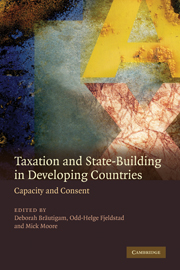Book contents
- Frontmatter
- Contents
- List of figures and tables
- List of contributors
- Acknowledgements
- 1 Introduction: taxation and state-building in developing countries
- 2 Between coercion and contract: competing narratives on taxation and governance
- 3 Capacity, consent and tax collection in post-communist states
- 4 Taxation and coercion in rural China
- 5 Mass taxation and state–society relations in East Africa
- 6 Contingent capacity: export taxation and state-building in Mauritius
- 7 Tax bargaining and nitrate exports: Chile 1880–1930
- 8 Associational taxation: a pathway into the informal sector?
- 9 Rethinking institutional capacity and tax regimes: the case of the Sino-Foreign Salt Inspectorate in Republican China
- 10 Tax reform and state-building in a globalised world
- References
- Index
5 - Mass taxation and state–society relations in East Africa
Published online by Cambridge University Press: 22 September 2009
- Frontmatter
- Contents
- List of figures and tables
- List of contributors
- Acknowledgements
- 1 Introduction: taxation and state-building in developing countries
- 2 Between coercion and contract: competing narratives on taxation and governance
- 3 Capacity, consent and tax collection in post-communist states
- 4 Taxation and coercion in rural China
- 5 Mass taxation and state–society relations in East Africa
- 6 Contingent capacity: export taxation and state-building in Mauritius
- 7 Tax bargaining and nitrate exports: Chile 1880–1930
- 8 Associational taxation: a pathway into the informal sector?
- 9 Rethinking institutional capacity and tax regimes: the case of the Sino-Foreign Salt Inspectorate in Republican China
- 10 Tax reform and state-building in a globalised world
- References
- Index
Summary
Introduction
In East Africa, as in many other agrarian societies in the recent past, most people experience direct taxation mainly in the form of poll taxes levied by local governments. Poll taxes vary in detail but characteristically are levied on every adult male at the same rate, with little or no adjustment for differences in individual incomes or circumstances. In East Africa and elsewhere in sub-Saharan Africa, poll taxes have been the dominant source of revenue for local governments, although their financial importance has tended to diminish over time. They have their origins in the colonial era, when at first they were effectively an alternative to forced labour. Poll taxes have been a source of tension and conflict between state authorities and rural people from the colonial period until today, and a catalyst for many rural rebellions.
This chapter has two main purposes. The first, pursued through a history of poll taxes in Tanzania and Uganda, is to explain how they have affected state–society relations and why it has taken so long to abolish them. The broad point here is that, insofar as poll taxes have contributed to democratisation, this is not through revenue bargaining, in which the state provides representation for taxpayers in exchange for tax revenues (Levi 1988; Moore 1998; Tilly 1992; and Moore in this volume). Instead, in East Africa poll taxes have mobilised rural people politically to combat a practice that they have experienced as repressive.
- Type
- Chapter
- Information
- Taxation and State-Building in Developing CountriesCapacity and Consent, pp. 114 - 134Publisher: Cambridge University PressPrint publication year: 2008
- 26
- Cited by



